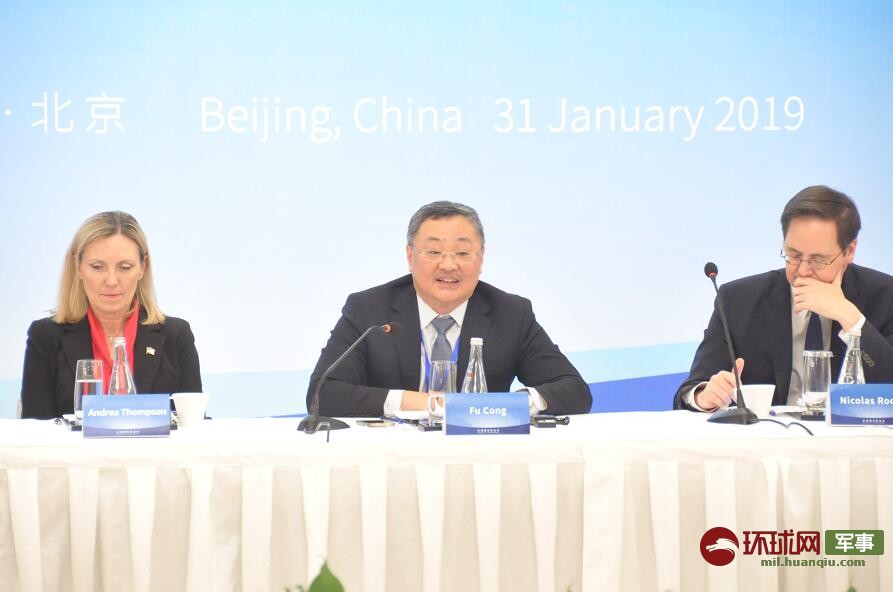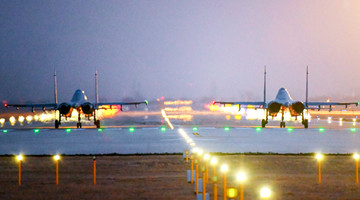By Yang Tiehu

Fu Cong (middle), director-general of the Department of Arms Control of the Ministry of Foreign Affairs of China, provides information to the Conference at the public event of the Second Beijing P5(five permanent members) Conference on the morning of January 31, 2019. (Photo by Yang Tiehu)
BEIJING, Feb. 1 (ChinaMil) -- Fu Cong, director-general of the Department of Arms Control of the Ministry of Foreign Affairs of China, spoke at the public event after the Beijing P5(five permanent members) Conference hosted by China Arms Control and Disarmament Association (CACDA) on Thursday morning that the five countries exchanged in-depth views on the international security environment, nuclear policy and related strategic issues, discussed how to strengthen the Treaty on the Non-Proliferation of Nuclear Weapons (NPT) regime, and formed six consensus points during the conference.
Firstly, P5 should jointly enhance mutual trust. The five countries recognized the importance of good relationships to the settlement of global strategic problems and expressed willingness to jointly maintain international peace and global stability. They agreed to treat each other’s strategic intentions objectively, enhance mutual trust and maintain common security, and do their utmost to prevent nuclear risks arising from misunderstanding and misjudgments.
Secondly, the integrity and effectiveness of the NPT regime should be maintained through cooperation. The five countries restated that the NPT is the cornerstone of the international nuclear nonproliferation regime and an important component of the international security architecture. They reaffirmed that P5 would be committed to strengthening the NPT system, and would submit national performance reports in accordance with understanding reached in the past. P5 promised to fully abide by all NPT provisions and promote the universality of the NPT, and emphasized that all parties should work together to promote the success of the 2020 NPT Review Conference. The five countries believed that the Treaty on the Prohibition of Nuclear Weapons (TPNW) deviates from and undermines the NPT, and reiterated their opposition.
Thirdly, the process of international nuclear disarmament should be promoted continuously. The five countries reiterated their commitment to the principle of undiminished security and the gradual realization of a nuclear-weapons-free world. They agreed to strive to improve the international security environment and promote greater progress in nuclear disarmament. At the same time, they emphasized maintaining the existing international arms control system and abiding by all international arms control agreements.
Fourthly, the legitimate security concerns of non-nuclear-weapon states should be properly addressed. The five countries reiterated their commitment to nuclear-free security, including active and negative security, reaffirmed their support for the establishment of nuclear-weapons-free zones (NWFZ), expressed their willingness to resume consultations with the state parties to the Treaty on Southeast Asia Nuclear-Weapon-Free Zone and to support the establishment of a Middle East zone free of weapons of mass destruction on the basis of voluntary agreements among all regional countries.
Fifthly, P5 expressed serious concern about the challenges to international peace and security posed by the proliferation of nuclear weapons and their means of delivery. At the same time, P5 promised to do their utmost to seek peaceful and diplomatic solutions in accordance with the Charter of the United Nations and the relevant agreements of the UN Security Council.
Sixthly, P5 reiterated their commitment to promoting the peaceful use of nuclear energy. P5 recognized the mutually beneficial nature of international cooperation in the peaceful uses of nuclear energy and its significance for sustainable development, expressed their willingness to continue to promote relevant international cooperation. At the same time, they emphasized that the safeguard system of the International Atomic Energy Agency (IAEA) should be strengthened, the level of global nuclear safety and security should be improved, and nuclear terrorism should be combated jointly.
On January 30th, the eighth P5 Conference was held in Beijing under the theme of “Strengthening P5 Cooperation, Safeguarding NPT Regime.” This is the second time that China has hosted the P5 Conference.
The P5 regime is a coordination mechanism formed by the five nuclear powers i.e. China, France, Russia, the United Kingdom and the United States as statutory nuclear-weapon states under the Treaty on the Non-Proliferation of Nuclear Weapons in the process of treaty review. Since 2009, they have maintained regular communication on important issues in the field of strategic security and jointly promoted the review process of the Treaty.









